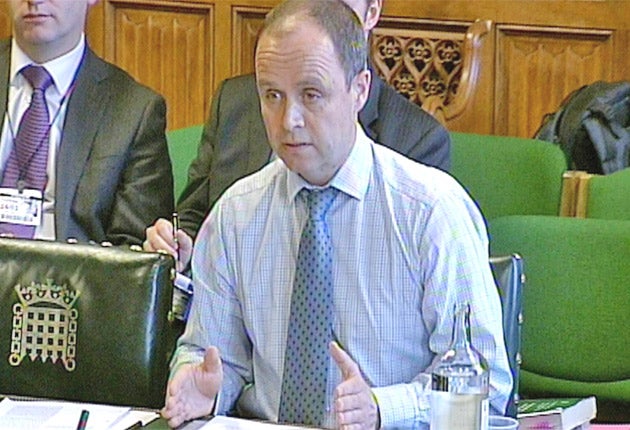Police lunch date under scrutiny in hacking case

A senior Scotland Yard officer met a former executive of the News of the World days after his force announced a new investigation into phone hacking at the paper, a leading MP said yesterday.
Chris Bryant told a Parliamentary inquiry that the Metropolitan Police's acting deputy commissioner, John Yates, lunched with the NOTW's former deputy editor, Neil Wallis, in February, shortly after the new inquiry into the illegal accessing of voicemails by the paper began on 26 January. Such meetings were unwise given the Met's record on hacking and could give rise to a perception that the country's biggest police force was "in collusion" with journalists, Mr Bryant said.
The former Europe minister was appearing before the Commons Home Affairs committee to discuss his claim that Mr Yates had misled the committee over the thoroughness of the Met's first investigation into hacking in 2006, which led to the imprisonment of the NOTW's private investigator Glenn Mulcaire and its royal editor Clive Goodman.
Heavily criticising the Met, Mr Bryant disclosed that he had written to Mr Yates in 2004 alerting him his own phone had been hacked, two years before the first inquiry began. Police had refused to hand over information on him held by Mr Mulcaire, forcing the MP to seek a court order for its disclosure, he added. In general, the Met had all the evidence but had failed to "join up the dots".
Asked why officers would have failed to conduct a proper inquiry, Mr Bryant said: "The Met police have not helped themselves by having regular meals with senior executives at the News of the World, at the same time as they are meant to be investigating the News of the World. I think, to be honest, that is a conflict of interest."
He added: "As I understand it, Mr Yates had lunch in February with Neil Wallis, who was formerly of the NOTW. I don't know whether he checked with Sue Akers, who is running the new investigation, whether that was an appropriate thing to do." The Committee did not ask Mr Yates about the lunch, and Mr Yates, testifying later, did not address it. He insisted Mr Bryant had made an "important" admission that prosecutors had advised the Met on hacking law (sitting at the back of the room, Mr Bryant shook his head).
The policeman disclosed the Met had been "researching" an admission in 2003 by Rebekah Wade (now Brooks, News International's chief executive) that reporters had paid police officers for information, but said no investigation was under way. He also confirmed he had sought public money to fund legal warning letters sent to The Guardian and a solicitor representing hacking victims, Mark Lewis.
Explaining the limited nature of the original investigation, Mr Yates restated his view that until recently police had been following prosecution advice that the interception of messages was only a crime if the intended recipient had not heard them first. Keir Starmer, the Director of Public Prosecutions, had only "revised" this at a case conference with police on 1 October last year, he said. "The DPP is quite entitled to change his opinion of the law," he added.
Mr Yates, who two years ago approved the original Met investigation, said he was "mystified" why Mr Starmer had subsequently claimed he had taken the DPP's statement "out of context", adding that he wished to avoid becoming embroiled in a public spat.
Subscribe to Independent Premium to bookmark this article
Want to bookmark your favourite articles and stories to read or reference later? Start your Independent Premium subscription today.
